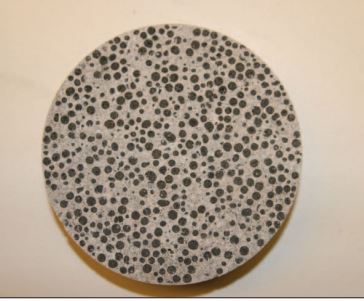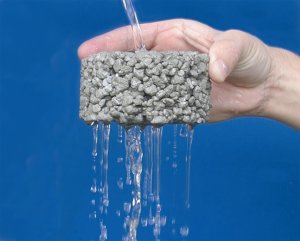Polymer concrete is a type of concrete that replaces cement by polymer as a binder. Sometimes, the polymer is used in addition to Portland cement to form Polymer cement concrete (PCC) or Polymer Modified Concrete(PMC).
Polymer concrete composites have a unique combination of properties depending on the formulation. These include rapid curing at ambient temperatures from –18 to +40°C (0 to 104°F); high tensile, flexural, and compressive strengths; good adhesion to most surfaces; good long-term durability with respect to cycles of freezing and thawing; low permeability to water and aggressive solutions; good chemical resistance; and lightweight.
Composition of Polymer Concrete
Thermoplastic polymers are used in polymer concrete but mostly thermosetting resins are used as the principal polymer component because of its high thermal stability and resistance for a wide variety of chemicals. It contains aggregates that include granite, quartz, silica, limestone and other high-quality materials. The aggregates used must be free from dust, debris and it is of good quality and must be dry. If these criteria are not fulfilled, it reduces the bond strength between the polymer binder and aggregates.
Types of Polymer Concrete
- Polymer Impregnated Concrete(PIC)
- Polymer Concrete (PC)
- Polymer Cement Concrete(PCC)
Polymer Impregnated Concrete (PIC)
Polymer impregnated concrete is mostly used polymer composite. It is a precast conventional concrete that is cured and dried in an oven or by dielectric heating from which the air in the open cell is removed by vacuum. Then a low viscosity monomer is diffused through the open cell and polymerized by using radiation, heat or by chemical initiation.
Polymer Concrete (PC)
Polymer concrete is an aggregate that is bound with a polymer binder instead of Portland cement as in conventional concrete. The main technique used in Polymer Concrete is to minimize the void volume in the aggregate mass to reduce the quantity of polymer needed for binding the aggregates. This is to be done by properly grading and mixing the aggregates to attain the maximum density and minimum void volume. The graded aggregates are vibrated in a mould. The monomer is then diffused up through the aggregates and polymerization is initiated by radiation or chemical means. A Silone coupling agent is combined with the monomer to improve the bond strength between the polymer and the aggregate.
Polymer Cement Concrete (PCC)
Polymer cement concrete is manufactured by mixing cement, aggregates, water and monomer. The plastic mixture is then cast in moulds, cured, dried and polymerized.
The monomers that are used in PCC are Polyester-styrene, Epoxy-styrene, Furans, Vinylidene Chloride, etc.
Properties of Polymer Concrete
- Rapid curing: Curing effect is rapid at ambient temperature (–18 to +40°C). Polymer concrete develops 70% strength after one day of curing at room temperature while the conventional concrete gains only 20% strength of its 28-day strength in one day.
- Strength: It has high tensile strength, flexural strength, compressive strength and good abrasion resistance as compared to cement-concrete.
- Good Adhesion: Good adhesion to most surfaces improves adhesion to the old surface.
- Durability: It gives good long-term durability of concrete with respect to cycles of freezing and thawing action and chemical attack, as it reduces the intrusion of chlorides and salts.
- Low Permeability and Water Tightness: It is low permeable to water.
- Lightweight: It produces lightweight concrete.
Advantages of Polymer Concrete
- Polymer concrete is highly unaffected by freezing and thawing.
- It has high compressive strength.
- It has high impact resistance.
- It has low permeability.
- It can be applied in very thin cross-sections.
- It reduces the intrusion of carbon dioxide, saving concrete from the carbonation and hence loss of alkalinity.
- It reduces shrinkage.
Disadvantages of Polymer concrete
- It is very expensive
- It requires high skill and precise work while mixing.
- Chemicals used in polymer concrete can be risky, hence mask and hand gloves must be used for skin protection.
Uses of Polymer Concrete
- It is used in road construction.
- It is used for nuclear power plant construction.
- Used in kerbstones.
- Used for prefabricated structural elements.
- Used in precast slabs for bridge decks.
- Used for waterproofing of buildings.
- It is also used in sewage work.
- It is used for irrigation works.
- It is used in marine works.
- It is used for prestressed concrete.
- Used in electrical and industrial construction
Also Read:


